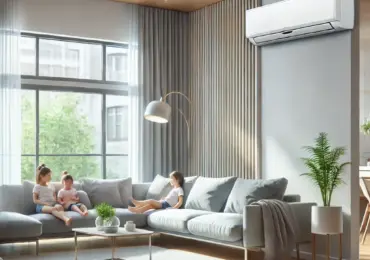What makes a home truly comfortable throughout the year? Temperature control and air quality play a huge role in creating a pleasant indoor space. A well-balanced environment keeps the home feeling fresh while preventing discomfort from extreme heat or humidity. With the right cooling system, every room can stay at a comfortable level, no matter the season. This article explores the benefits of air conditioning for comfort and indoor air quality. Let’s look at the key advantages.
Filtering Out Dust and Allergens
Indoor air often contains small particles like dust, pollen, and pet dander. A residential air conditioner helps trap these particles through advanced filtration. Cleaner air reduces sneezing, irritation, and other reactions caused by airborne pollutants. This results in a healthier and more breathable indoor environment.
For households with pets, effective air filtration is even more essential. Pet hair and dander can spread quickly, settling on furniture and floors. A high-quality cooling system reduces the circulation of these allergens, keeping the air cleaner. Regular maintenance of filters ensures that the system continues to provide fresh, purified air while maintaining efficiency.
Consistent Indoor Temperature for Every Season
No one enjoys a home that’s too hot in summer or too cold in winter. A cooling and heating system ensures every room stays at the right temperature all year. It prevents sudden changes that make indoor spaces uncomfortable. Even during extreme weather, a high-performing system keeps living spaces enjoyable. This balance enhances relaxation, making it easier to unwind after a long day.
A stable indoor climate also improves daily activities. Whether working from home, cooking, or spending time with family, temperature control makes every task more pleasant. Extreme heat can cause fatigue, while cold temperatures can lead to stiffness and discomfort. By maintaining a consistent temperature, an efficient cooling system supports overall well-being and productivity.
Reducing Humidity for a More Comfortable Home
Excess humidity can make a home feel stuffy and unpleasant. When moisture levels rise, the air feels heavy, and surfaces may become damp. A high-quality cooling system helps regulate humidity by removing excess moisture from the air. This creates a fresher, more comfortable atmosphere indoors. A well-maintained system also prevents issues like condensation and dampness that can affect furniture and walls.
High humidity can also encourage the growth of mould and mildew. These issues not only cause unpleasant odours but can also affect indoor air quality. Controlling moisture levels prevents these problems, keeping the home healthier. A dry, well-ventilated space reduces the risk of damage to wooden furniture, carpets, and walls. This helps maintain the integrity of the home while enhancing comfort.
Improved Air Circulation for a Fresher Environment
Proper airflow is essential for maintaining a pleasant indoor space. Without it, rooms can feel stale, leading to discomfort. A well-functioning air conditioning unit ensures steady air movement, preventing stuffy conditions. Fresh air is constantly circulated, reducing stagnant pockets that trap heat and odours. This keeps every room feeling airy and refreshing, even in the hottest months.
Good air circulation also prevents uneven temperatures in different parts of the home. Some areas may naturally trap heat, making them uncomfortable without proper ventilation. A cooling system evenly distributes air, ensuring every room benefits from consistent airflow. This is especially helpful in multi-story homes where heat tends to rise, creating warmer conditions upstairs.
Minimising Indoor Pollutants for Better Health
Everyday household activities can introduce pollutants into the air. Cooking, cleaning products, and even outdoor pollution can affect indoor air quality. A well-maintained cooling system helps remove these contaminants, ensuring fresher indoor air. This reduces exposure to irritants that may cause headaches or respiratory discomfort. The result is a cleaner, healthier space for the entire household.
Indoor pollutants can accumulate over time, leading to long-term health concerns. Volatile organic compounds (VOCs) from paint, furniture, and cleaning products can affect air quality. Proper ventilation combined with effective filtration helps reduce the presence of these harmful substances. Regular filter replacement and system maintenance play a key role in keeping indoor air safe to breathe.
Choosing the Right System for Maximum Comfort
Not all cooling systems offer the same level of performance. Selecting the right unit ensures better temperature control and air quality. Proper sizing, installation, and maintenance all play a role in achieving the best results. Regular servicing helps maintain efficiency and prevents unexpected breakdowns.
Energy efficiency is another important factor to consider when choosing a cooling system. A properly sized unit runs more efficiently, reducing energy costs while maintaining a comfortable indoor environment. Modern cooling systems offer advanced features like programmable settings and smart controls, allowing homeowners to customise their comfort levels while optimising energy use.
A well-regulated indoor environment makes a noticeable difference in daily life. Clean air and steady temperatures improve comfort and overall well-being. A residential air conditioner enhances air circulation while filtering out pollutants for a healthier space. Investing in a reliable system ensures year-round comfort and improved air quality indoors.
